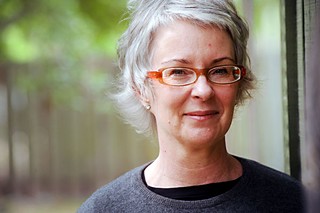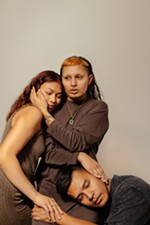The Fun Platform
Helen Knode's new murder mystery finds her leaving noir and stepping into the light
By Cindy Widner, Fri., April 27, 2012
She looks like an elegant tech mogul or a grown-up version of those slight, reluctant action heroines of late – the ones with the dragon tattoos and the bow-and-arrow setups. But something about author Helen Knode conjures words like "dame" and "broad," even "spitfire." She has, after all, thrived in those male-dominated arenas that in old-fashioned movies only gals with moxie, spunk, and a little leg could penetrate: the movie industry, journalism, and detective fiction of the hard-boiled variety.
You'd also have to throw in a little Susan Sontag, a lot of Pauline Kael (though Knode doesn't like her taste), maybe some Ellen Willis. A little Kathryn Bigelow. And some Scarlett O'Hara.
When Knode attended graduate school at Cornell briefly in 1981, she said, settling into an armchair at her Austin home, that she got "totally hepped up on theory": post-structuralism, deconstructionism, and the like. "Inside 15 minutes, I knew I was in the wrong place. My mind doesn't work that way." Nevertheless, the general atmospheric condition of the time, heavy with theory – including feminist theory – sunk into her work as she started writing film and theatre reviews for The Cornell Daily Sun, then New York's East Village Eye. "I got into the downtown New York scene," she said. "It was 1984, and it was just jumping."
When the LA Weekly came calling, Knode headed west to become one of its main film critics – a contrarian one, according to her, particularly when it came to women and Hollywood, on- or offscreen. Molly Haskell's book From Reverence to Rape, the organizing tenet of which is that "the rise of all the violence against women within movies coincides with the women's movement – you're stepping out of place, and so all this violence arises" – was Knode's "bible" then.
"Another hard wall I came up against is the unredeemable sexism in Hollywood and the studio system in movies," she said. "Women like Kathryn Bigelow have Hollywood careers. But if Kathryn Bigelow were a man, she would be directing a movie every year."
Knode said that even though her brand of feminism was "unprogrammatic and untheoretical," she still found the analysis unrewarding after a point. "I realized that I was not taking pleasure from the movies," she said. "I started to realize it's not all about politics. How many movies are going to satisfy me politically? In how many movies are there women with agency? Even on the margins, the guys can scare up more money than the women. You can spend your life in a complete toot about all this stuff – which I can't do, after seven or eight years of being enraged all the time, because it's exhausting. I loosened up and started liking a whole lot of things – there's these pleasures that mainstream films can give you."
Given all the thinking about women, Hollywood, and violence that Knode had been doing, it's hard to say whether what she did next was surprising or made complete sense: She met and married noir king James Ellroy of Black Dahlia fame. The San Francisco Chronicle's Books editor wrote that it was as if "Gloria Steinem had married Mickey Spillane." The two moved to Kansas City, and Knode wrote The Ticket Out, a murder mystery set in Hollywood, featuring a movie reviewer named Ann Whitehead who finds a dead woman – an aspiring screenwriter and producer, not an actress – in her bathtub.
Wildcat Play, Knode's new mystery, takes yet another turn, this one a little to the right. Whitehead has hightailed it from L.A. and landed in the bleak oil country around Bakersfield, Calif. Through family connections, she lands a job as a novice roughneck on a rig wildcatting for natural gas. In the tiny nearby town of Wilson. On purpose. Soon enough, there's a dead body on the rig, Whitehead suspects murder, and we're off.
"The first book is noir. It's the darkest picture I could paint of the condition of living in Hollywood. It's straight out of Ellroy," said Knode. (She and Ellroy have since divorced.) "What I wanted to do in Wildcat is be fun and light and talk about this thing that nobody wants to talk about, which is the oil business – and my version of it." Knode's oil-patch and Texas roots go back four generations. (She said she was conceived in Austin and has now returned to the "scene of the crime.") Her geologist father graduated from the University of Texas, but she grew up in Calgary, Alberta, because that's where the oil was at the time.
"This is my farewell to the oil fields. I grew up with these kind of guys," she said, meaning the independent wildcatters who take big risks and rarely get big rewards. "These guys hate big oil as much as any environmentalists do. These are the grassroots, American, independent producers. That's that wild breed of cat."
Wildcat Play is populated with characters that would not be out of place in the TV show Dallas if that show had paid any attention to the mechanics of how the Ewings became rich. In addition to the spunky Whitehead, her possible boyfriend, Doug (an LAPD homicide detective), and local and Okie roughnecks galore, there are three generations of families who have different relationships to the oil industry and hold the many secrets of people who have lived together a very long time in a very small town. "It turned into a fond portrait of these people, who are not all good people," said Knode. "But they are anarchic in their way and doing an important job."
Knode may have grown up around the oil business, but she didn't know much about it when she started Wildcat Play. Her research eventually took her to western Oklahoma where she made her way onto a rig that was wildcatting for natural gas and learned at the feet of the "toolpusher" (rig manager) there. The vivid detail in Wildcat Play is evidence of her thoroughness, but we're still talking murder mystery here, one that comes together in ways both classic and modern.
That throwback quality came about, Knode said, because she wanted to counter the CSI-spawned belief that crimes are solved in labs. "I wanted to write a crime novel where there are no forensics whatsoever. It's a killing in a tule fog [a dense fog that settles on the ground, often for weeks, in that area of California] on a rig floor; there are no alibis, there are no time frames, there are no footprints, there are no fingerprints, anybody within a hundred-mile radius could be on and off the rig floor to do this. So it becomes a novel about people, connections between people, because that's what it boils down to. It turned out to be an old-fashioned novel about a time and a place."
At the same time, she said she wants to bring attention to the "general problem of the invisibility of the resource extraction industries." She held forth about the canonical oil novels and anointed D.H. Lawrence the "great coal-mining novelist." She pointed out the irony of sending environmental manifestos from laptops made of petroleum products and spoke of how we can't live in an "either-or" world when it comes to energy sources. She said the end point of her feminist thinking is "just do your job," like Whitehead does on the rig.
Then, like all people for whom words are of utmost importance, Knode wanted to make sure she got it exactly right. A few days after the interview, she sent this email about her journey from academic theory to genre fiction: "At some point I got exhausted with politics and thinking about art in primarily political terms. I started in alternative journalism when Ronald Reagan was president and we were in a righteous toot every minute of every day about something. It wasn't only draining and depressing. It obscured the fact that my view of the world is essentially comic and optimistic – and it's taken me a long time to re-find the joy and laughter (while still paying attention to the state of the world and contributing where I feel necessary). Wildcat Play is the first plank in my new Fun platform."
Helen Knode will read from and sign copies of Wildcat Play on Friday, April 27, 7pm, at BookWoman, 5501 N. Lamar.










